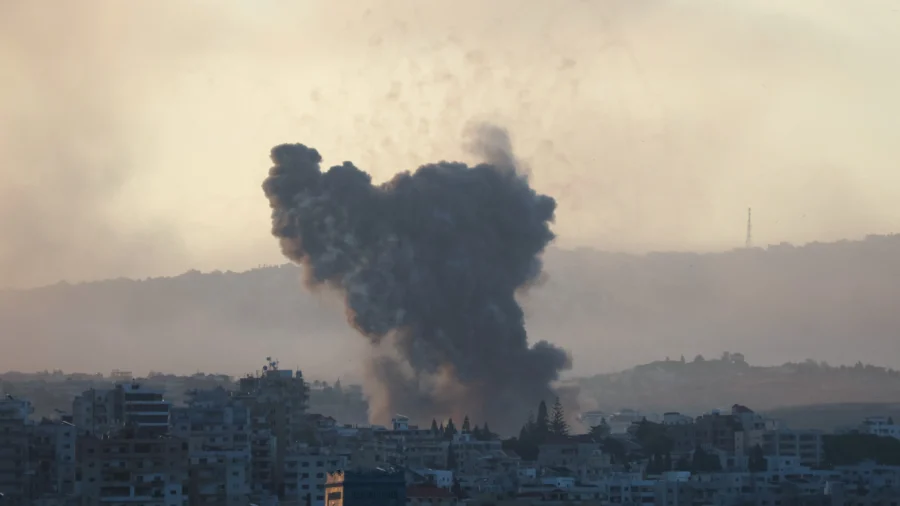Lebanese health officials said on Sept. 23 that 492 people were killed in Israeli airstrikes targeting southern Lebanon, as the Israeli Defense Forces (IDF) announced that it had hit 1,600 Hezbollah targets.
More than 1,600 people were wounded in the strikes and thousands have fled, with the main highway out of the southern port city of Sidon jammed with cars heading toward Beirut.
At a Sept. 23 cabinet meeting, Lebanon’s caretaker prime minister, Najib Mikati, called the barrage a “genocide in every sense of the word.”
Israeli Prime Minister Benjamin Netanyahu has said that his nation faces “complicated days” ahead and called for citizens to stay united as the campaign continues.
“I promised that we would change the security balance, the balance of power in the north—that is exactly what we are doing,” he said in a message following a situational assessment at military headquarters in Tel Aviv.
Earlier, the IDF urged residents of southern Lebanon, which borders northern Israel, to evacuate homes and other buildings where Hezbollah stores weapons, as Israel said it was set to carry out “extensive strikes” against the terrorist group.
This follows a heavy exchange of fire on Sept. 22.
Hezbollah attacked northern Israel with about 150 rockets, missiles, and drones in response to strikes that killed a top commander and dozens of fighters.
The escalating exchanges have increased fears of all-out war, as Israel continues its fight against the Hamas terrorist group in the Gaza Strip and attempts to rescue the remaining hostages taken in the Oct. 7, 2023, Hamas attack on Israel.
Hezbollah has vowed to continue its strikes in solidarity with Hamas, a fellow Iran-backed group, while Israel says it is determined to return calm to the border.
An Israeli military official said the nation is focused on aerial operations and has no immediate plans for a ground operation.
The official, speaking anonymously in keeping with regulations, said the strikes are aimed at curbing Hezbollah’s ability to launch more strikes into Israel.
Media outlets in Lebanon reported that residents had received text messages urging them to flee any building where Hezbollah stores arms and remain away until further notice.
“If you are in a building housing weapons for Hezbollah, move away from the village until further notice,” the Arabic message read, according to reports.
It was not immediately clear how many people were affected by the Israeli orders. Communities on both sides of the border had largely emptied already because of the near-daily exchanges of fire.
Israel has accused Hezbollah of turning entire communities in southern Lebanon into militant bases, with hidden rocket launchers and other military infrastructure.
This accusation could precipitate an especially heavy bombing campaign, even if no ground forces move in.
Israel said it had targeted more than 150 terrorist sites early on Sept. 23, and residents of different villages in southern Lebanon posted photos on social media of airstrikes and large plumes of smoke.
Lebanon’s state-run National News Agency also reported airstrikes on different areas.
On Sept. 20, an Israeli airstrike on a Beirut suburb killed a top Hezbollah military commander and more than a dozen fighters. Dozens of civilians, including women and children, were also killed.
Last week, thousands of communications devices, including pagers and walkie-talkies used mainly by Hezbollah members, exploded in different parts of Lebanon, killing 39 people and wounding nearly 3,000.
Lebanon has blamed Israel for the attacks, but Israel has neither confirmed nor denied its involvement.
Hezbollah began firing rockets into Israel a day after Hamas’s Oct. 7, 2023, attack in what it said was an attempt to pin down Israeli forces to help Palestinian fighters in Gaza.
Israel retaliated with airstrikes, and the conflict has steadily intensified over the past year.
Hundreds of people in Lebanon and dozens in Israel have died in the violence, which has also displaced tens of thousands of residents on both sides of the border.
Israel has vowed to push Hezbollah back from the border so that Israeli citizens can return to their homes.
Israel says it would prefer to do so diplomatically but is willing to use force.
Hezbollah has said it will keep up its attacks until there is a cease-fire in Gaza.
In another sign of escalation, the Iran-backed Islamic Resistance in Iraq (ISI) claimed responsibility on Sept. 22 for launching cruise missiles and drones toward Israel overnight in coordination with Lebanon’s Hezbollah.
In a statement, the ISI said that it had launched a drone attack targeting an Israeli military base in the Jordan Valley.
The IDF said on Sept. 22 that a drone entering Israeli airspace from the east was shot down by the Israeli Air Force over the southern Golan Heights. Sirens in the area were triggered to warn of potential falling shrapnel, but no injuries or damage was reported.
The Associated Press contributed to this report.
From The Epoch Times

